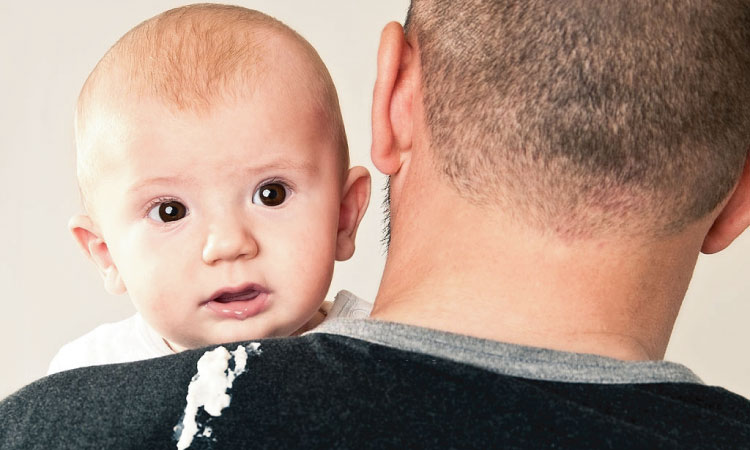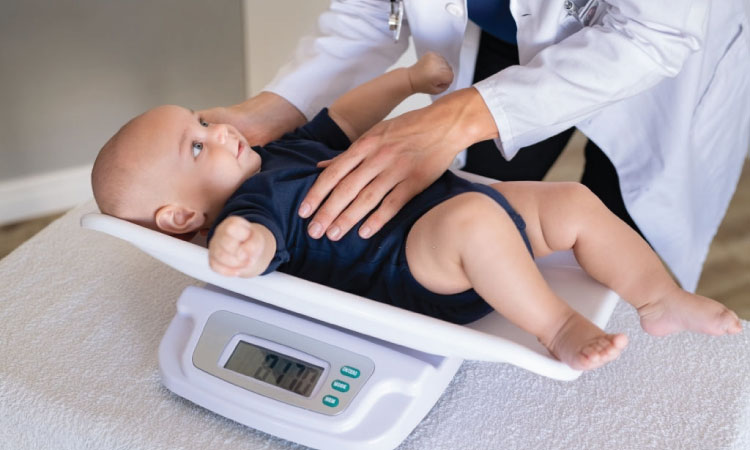A healthy baby is the first thing on the parent’s mind and all efforts are done to ensure that the baby gets adequate nutrition. After the birth of the baby, the baby must be fed well either by being breastfed or by formula feeding as per the doctor’s suggestion. Health experts believe that as long as the baby is latching well to the breast and getting fed, the weight gain is consistent, yet it is seen that even after being fed well, some babies do not show a healthy weight gain pattern. So, the concern is “why the baby is not gaining weight”? Who does not want a chubby-looking baby, one who is smiling and roly-poly but if the baby even after being well fed does not show weight gain and is not healthy enough, is it a major cause of concern?
In the article below, we are going to read through a few postulates regarding the same and also understand a few reasons that hinder the healthy weight gain process of the baby.
When Should I Worry About Baby Not Gaining Weight?
Baby not gaining weight is a thing to worry about. It is important to remember that even a healthy baby tends to lose at least 8% or more of their birth weight in the initial days. According to a source, by the time they reach 2 weeks, they should have regained their actual birth weight and after a year, tripled their original birth weight.
Since all babies are different, the weight gain is also different for them. Few have a smaller growth rate than others. Yet, if the child is getting proper feed, yet not gaining weight, the parents think “why the baby is not gaining weight from breastfeeding”? It certainly is a cause of worry for them however, there are certain pointers that one should look for.
Related Reading: 9 Biggest Challenges Of Breastfeeding No One Prepares You For
It is suggested by health experts that a breastfed baby should be fed well every 2-3 hours and a formula-fed at a gap of three hours each. Since every child has a specific and unique growth pattern, parents should not compare the two infants born at the same time. Both have different genes and bodies so while one can be chubbier the other can be slightly leaner which should not be a sign of bother for the parents.
Under some conditions though, parents need to worry and consult a health expert and they are:
- In case the baby keeps falling ill often and is very sleepy and cranky
- If the baby is finding it difficult to latch on to the breast and making a sucking noise that is too loud. This happens as they are moving the jaws too quickly and finding it difficult to get milk
- If the mother feels that the breast is not tender enough even after feeding the baby, this shows a sign of the child not getting enough milk. The breast is filled with milk and if the baby latches properly and gets fed, the breasts tend to become softer. On the other hand, if the adequate milk is not taken by the baby, the milk would stay in the breasts making it hard
- If after the regular weighing of the baby, the weight stops increasing after the first three months, it is an indicator of bad nutrition
Related Reading: 9 Reasons You Feel Your Baby Is Always Hungry (0-1 Years)
All the above signs need a consultation with the doctor as they are not healthy signs for the growth and development of the baby.
10 Common Reasons Your Baby Is Not Gaining Weight?

If even after being well-fed and having proper rest and care, the baby does not show adequate weight gain, it is worrying for the parents. Let us try and see some common reasons that can attribute to slow weight or no weight gain in babies. Some of them are:
1. Malabsorption
This is a common reason for a baby to not gain weight. It could be due to some infection, stomach aches, stools with a foul smell, vomiting, gas, etc. All these symptoms together show that the baby is not able to digest the food well. Since the baby is too small, the parents should keep a check and seek medical help to rule out these reasons1.
2. Poor breastfeeding
It should be seen by the mother that the baby latches well to the breast and gets fed from both sides. Also, she should feel tenderness in her breast indicating that the baby is being fed well. Breastfeeding is bliss for the baby as it has all the antibodies that make his immune system stronger. In case these signs are not adhered to in the past, it leads to poor immunity and also a reason for the baby not to gain adequate weight. There are a few breastfeeding tips for the first-time mothers that should make the process easier and beneficial for the baby as well as the mother.
3. Premature and low birth weight of babies
Babies who are born before the date and have low birth weight tend to have a bad sucking reflex which does not allow them to absorb all the nutrients resulting from the baby not gaining weight2. Premature babies are recommended being bottle-fed because their nutritional needs differ from that of a term baby.
4. Not getting proper feed
The baby needs to be fed on demand every three to four hours, but in case the baby sleeps too much and does not get adequate feeds, it can lead to the baby not gaining weight3.
5. Gastrointestinal issues
It is common for newborn babies to have gastrointestinal issues, which lead to poor digestion and absorption leading to inadequate weight gain4.
Related Reading: How And When To Use Apple Juice For Baby Constipation (Till 2 Years)
6. Genetic disorder
Few children may have genetic disorders like Prader-Willi syndrome (PWS) that hinder weight gain which should be shown to a medical health expert.
7. Problems with the heart
A baby who has a heart ailment might have difficulty in breathing and not have a good appetite also leading to inadequate weight gain.
8. Vomiting

The baby might not be able to digest the food due to acid reflux or excessive vomiting. This can also hinder weight gain in babies5.
9. Pancreatic problems
According to a source, the baby who cannot digest food due to the poor capacity of the pancreas will also show inadequate weight gain. This is characterized by foul-smelling or greasy stool.
10. Not getting enough calories
For infants, inadequate calories could lead to low weight gain. Mothers must pay attention to signs of low milk supply which could be due to inverted nipples or inadequate milk production. Improper mixing of formula for formula-fed babies can also lead to low weight gain. The formula can clearly define the right concoction to be made, but if the ratio of the water to the powder is more or less, it can show improper weight gain in babies.
Why The Premature Baby Is Not Gaining Weight?
Any baby who is premature if they are born before 37 weeks of gestation. The baby undergoes many problems regarding their health. It is also important to take extremely good care of their nourishment as they are born weak. The parents need to ensure adequate weight gain which is important for the overall development of the baby. Premature babies start gaining weight within a few days after they are born but if born too early or too little in weight, they only gain 5 grams daily6.
If the baby is premature, the parents are always worried as many precautions have to be taken. Even after all efforts and care is taken it is seen that “a premature baby is not gaining weight.” Thus, we need to understand why this happens. Let’s see some scenarios in which a premature baby might not gain weight.
- Premature babies have bad sucking reflux, so they end up vomiting
- Their cucking and swallowing reflexes are not well developed so they face difficulty
- They tend to sleep when being fed.
Apart from the above-mentioned factors, it could also be due to the following
- Food allergy and difficulty in breathing
- Heart issues
- Continual stools
- Celiac disease.
- Too small in size
Related Reading: 13 Health Problems That May Affect Premature Babies
Since preterm babies or preemies as they are called are born weak and need more calories to become strong, more care has to be taken than a regular baby. The body of a preterm baby is struggling hard to survive and heal and many parts are still developing so little care and alertness would help7.
Why Is The Toddler Not Gaining Weight Despite Eating?

The weight of the baby is an indicator of how healthy the baby is. It is seen that chubby babies turn out to be toddlers who are not so healthy and a cause of concern for the parents is that the toddler is not gaining weight but eating. It is difficult for parents to see the baby fat disappearing and the babies shrinking. For healthy weight gain in toddler certain common foods are highly recommended. Health experts believe that as the child grows, they are more active, and grow either in height or in weight, yet there are many other factors that one needs to look for and they are:
1. Digestive issues: Sometimes, even after the toddler is eating well, there is an underlying medical condition that is hindering the digestion process not resulting in weight gain. Issues like liver disease, celiac disease, or acid reflux make it difficult for the kids to absorb the nutrients
2. Food intolerance: Even though the child is eating well yet the body is sensitive to some foods and not able to digest them. For example, some kids are lactose intolerant and cannot digest milk products, others have protein intolerance which does not allow them to have cheese, yogurt, etc8
3. Bad immune system: If as babies the child is not fed well or is under-nourished, the immune system is not so strong and so the child will keep falling ill despite eating well and show no signs of weight gain
4. Undiagnosed medical condition: The toddler who has liver, kidney, lungs, or endocrine issues might need more calories than other kids
5. Infections: While fighting any infection, the body uses all the calories, so while the toddler is eating well, all calories are being used and that is causing inadequate weight gain9
6. Metabolic disorders: Few health conditions do not allow the body to break down or absorb the energy from the food leading to the toddler not gaining adequate weight
Related Reading: 15 Most Common Unhealthy Foods For Toddlers
Thus, as parents, one has to be very careful that as babies extreme care is taken regarding the nutrition of the baby. If the immune system of the baby is developed well then in the future the health will not be compromised. So, the early years of a baby are like the building blocks on which the future is dependent. Thus, the parents should invest in the initial years for better yields in the future.
FAQ’s
It is important to identify if the child is malnourished and that is the first step towards the healthy development of the child.
As per WHO, certain benchmarks have been set up for the growth of the baby and that also helps the parents to understand the difference between healthy and malnourished baby.
The WHO standards for weight loss or gain in babies are:
-The newborn is expected to lose 5-10% of their birth weight within the first week of their delivery
-The newborn baby recovers from the weight loss in the first week by the end of three weeks-
-The weight of the baby doubles from the first to four months
-The boys tend to gain three times their birth weight by the time they are a year old whereas girls take 16 months to do the same
-The length of the baby tends to increase one and a half times by the first year
-The head circumference of the baby increases by 11 inches by the first birthday or around that time
If the poor weight gain in infants is not managed or left unmonitored, it can lead to severe complications like:
-Malnutrition
-Weak immune system
-Growth instability
-Heart problems
-Lack of energy
-Fever
-Weak muscle structure
Thus, medical consultation must be done in case the baby is malnourished or not putting adequate weight due to one reason or the other. Nothing to be worried about as many treatments and alternatives can help.
In case the baby shows less weight gain for a longer period, it can indicate inadequate calorie intake and nutritional requirements which should be discussed with a doctor. This could also be due to a premature or an abnormal baby whose nutritional requirements are not met.

